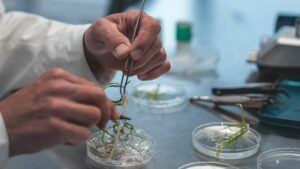National
MONSANTO AND WHEAT FARMERS SETTLE
After a number of lawsuits related to the May 2013 discovery of genetically-modified wheat on a farm in eastern Oregon and temporary limits on certain exports of soft white wheat, Monsanto Company has entered into a settlement agreement with soft white wheat farmers in the Pacific Northwest.
Under the settlement and without any admission of liability, Monsanto will pay $250,000 to wheat growers’ associations, of which $100,000 will go to the National Wheat Foundation and $50,000 each to the Washington Association of Wheat Growers, the Oregon Wheat Growers’ League and the Idaho Grain Producers’ Association. Monsanto will also pay $2.1 million into a settlement fund, which will be designated to pay Washington, Oregon and Idaho farmers who sold soft white wheat between May 30 and Nov. 30, 2013.
“Rather than paying the costs of protracted litigation, this agreement puts that money to work in research and development efforts for the wheat industry,” says Kyle McClain, Monsanto chief litigation counsel.
ABM FILES FOR PATENT
Advanced Biological Marketing has filed a patent on Focused Microbial Diversity (FMD) , a technique used to research and develop microbials in ABM products.
“The FMD platform allows ABM to screen a wide array of microbial strains in the lab for specific traits and characteristics that benefit the plant without engaging in massive field trials,” says Dan Custis, CEO of ABM.
ABM uses genomic technologies and high throughput phenotyping to identify elite strains for its FMD platform. Genes and gene sequences are identified that are predictive of exceptional performance in the field and used to assemble strain consortia providing broad spectrum benefits.
International
EU PROVISIONALLY AGREES ON GMOs
“I am glad to announce that the European Parliament and Council have reached a provisional political agreement on the draft legislation on GMO cultivation,” said Vytenis Andriukaitis, the European commissioner for Health and Food Safety, in early December. “The proposal will give member states the possibility to restrict or prohibit the cultivation of GMOs on their territory, without affecting the EU risk assessment.”
If confirmed, this agreement would meet members states’ calls since 2009 to have the final say on whether or not GMOs can be cultivated in their territory. Andriukaitis says that he fully trusts that this agreement in principle will be formally endorsed in the coming weeks by the European Parliament and Council.













